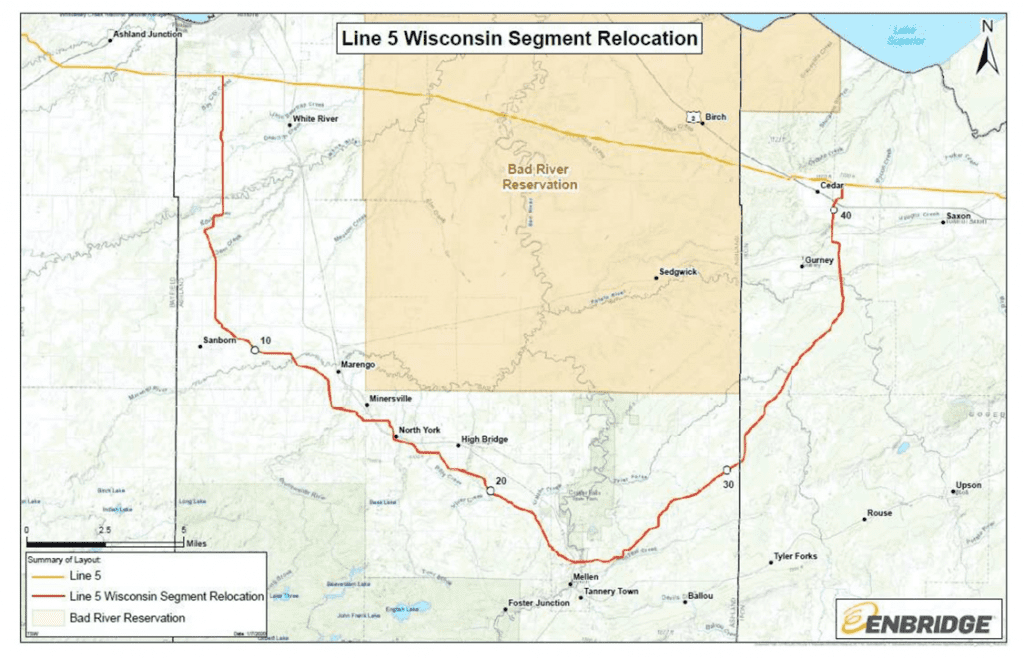Guides to Oil Pipeline Regulation in Wisconsin
WI Green Fire, April 4, 2020

Updated July 2, 2020
Wisconsin’s Green Fire (WGF) is partnering with Midwest Environmental Advocates (MEA) to produce a series of guides on regulatory processes involved with the proposed reroute of Enbridge Line 5 in northern Wisconsin. Line 5 is a hazardous liquid pipeline that conveys light and synthetic crude oil and natural gas liquids from Superior, Wisconsin to Sarnia, Ontario through northern Wisconsin and both the Upper and Lower Peninsulas of Michigan.
The MEA – WGF guides will be applicable to pipeline routing, construction, and operation throughout Wisconsin. The purpose of these guides is to provide general legal and technical information about regulatory programs that apply to pipeline construction and operation in Wisconsin and highlight the opportunities for public input into the processes. The first in the series is A Guide to Eminent Domain and Condemnation for Oil Pipelines in Wisconsin (February 2020)
Eminent domain is the power of government to seize private property for public use. Wisconsin law authorizes the Public Service Commission to grant the power of eminent domain to oil pipeline companies that are authorized to do business in the state, transmit oil in pipelines, maintain terminal or product delivery facilities in the state, and engage in interstate or international commerce. This guide explains the steps in the process and the opportunities for parties to intervene.
A Guide to the Environmental Review Process for Oil Pipeline Construction in Wisconsin (March 2020) describes the environmental review required of state and federal agencies under the Wisconsin Environmental Policy Act (WEPA) and the National Environmental Policy Act (NEPA).
A Guide to Agency Permits & Approvals for Pipeline Construction in Wisconsin (April 2020) summarizes the environmental permits, approvals, and public input opportunities for these federal and state actions.
A Guide to Water Resources Permitting (May 2020) discusses the permits required for pipeline construction concerning wetland fill and impacts, waterway crossing, grading on the bank of a waterway, and stormwater management.
Impacts to Tribal Rights and Resources from Oil Pipeline Construction in Wisconsin (June 2020) describes the rights and concerns of tribal nations and members in Wisconsin.
A Guide to Local Government Regulation of Oil Pipelines in Wisconsin (June 2020) describes actions local governments can and cannot take in response to oil pipelines in their communities.
Enbridge’s Proposed Reroute of Line 5 in Northern Wisconsin
The existing Line 5 pipeline crosses the Bad River Reservation in northern Wisconsin where the continued operation of the pipeline despite expired easements has led the Bad River Band of Lake Superior Chippewa to file suit against Enbridge. In the lawsuit, the Band is seeking removal of the pipeline from the Reservation. Enbridge has indicated that it’s preferred reroute is just outside of the Reservation.
The Bad River, a major tributary to Lake Superior, flows through a remote area of the state with outstanding natural and cultural resources, including the Kakagon-Bad River sloughs, a large coastal wetland complex of international significance on Lake Superior. Many local citizens, both tribal and non-tribal members, are concerned about the possibilities of a major oil spill in the watershed.
Wisconsin Department of Natural Resources Hearing July 1, 2020
The DNR has scheduled an online public hearing on July 1 on the proposed reroute of Enbridge’s Line 5 pipeline in Ashland, Bayfield, and Iron Counties. The hearing will cover Enbridge’s application for a waterway and wetland permit, as well as the proposed scope of the Environmental Impact Statement [PDF] (EIS) that will be prepared for the overall project. Written comments on the proposed waterway and wetland permit and EIS scope are due July 11, 2020. Please see the DNR web site on the Enbridge project at https://dnr.wi.gov/topic/eia/enbridge.html for more information on registration for the hearing, how to submit comments, the draft EIS scope, and links to the draft waterway and wetland permit.
MEA and WGF’s upcoming guides to oil pipeline regulation will address local government options and tribal concerns.
